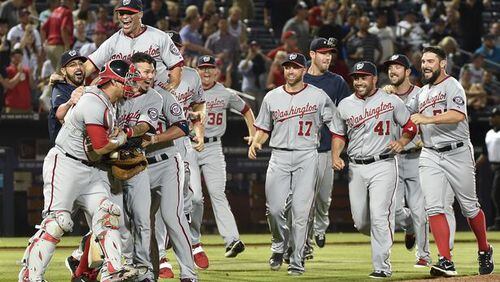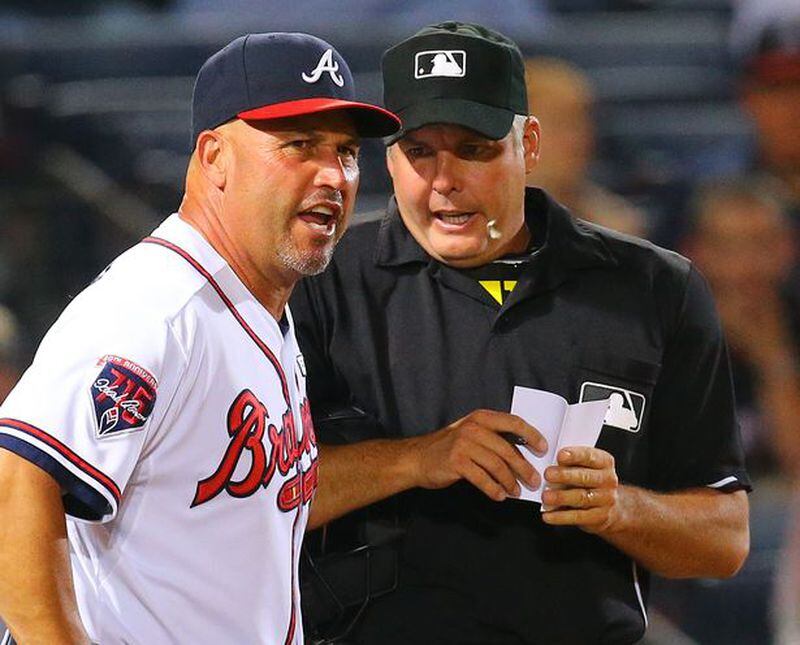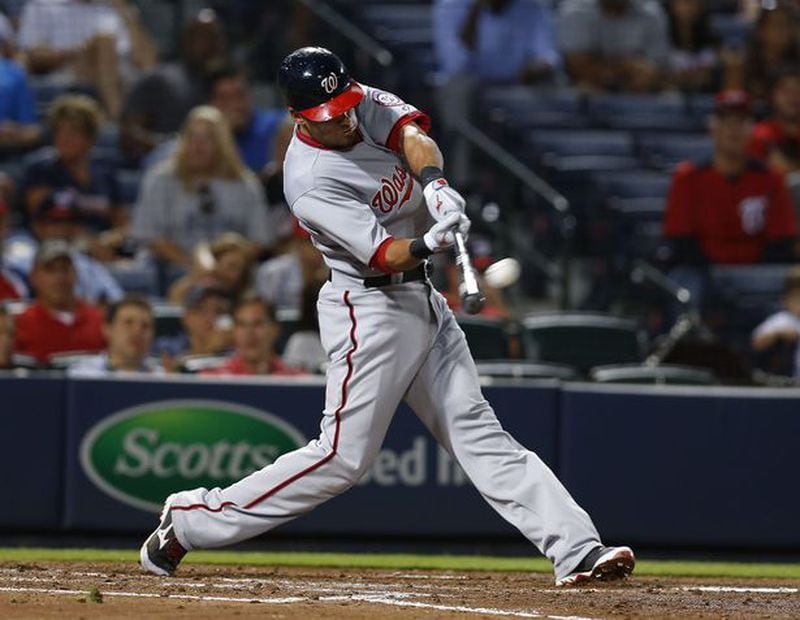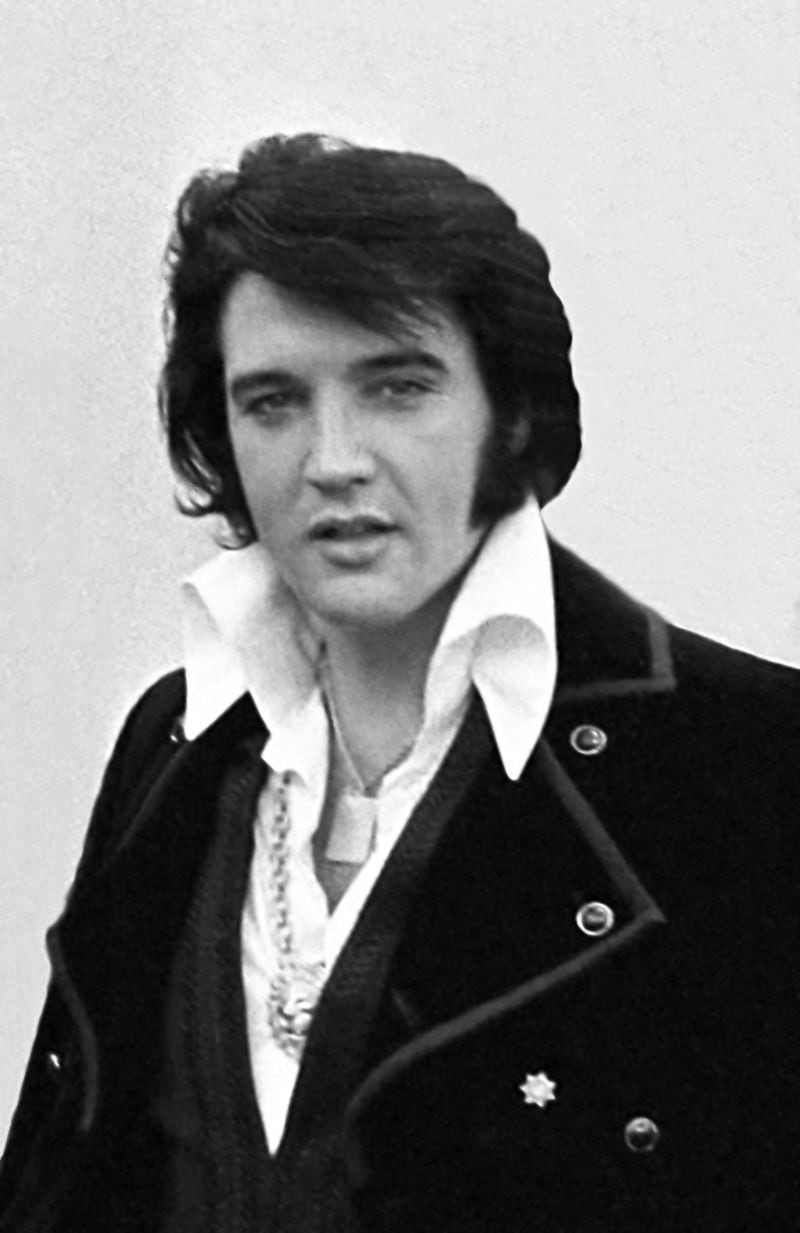Many have asked how the Braves could have gone so far off the rails this season, just one year after winning the NL East with a 96-66 record. They fell to 75-76 with Tuesday night’s loss to Washington, then saw the Nationals celebrate at Turner Field, as that game clinched the division title for Atlanta’s chief rivals.
It was not surprising that Washington clinched at Turner Field, where visiting teams have celebrated after winning postseason series, wild-card games or playoff berths on a regular basis since the joint opened for baseball 1997. That’s one bit of history the Braves will be glad to leave behind when they move to their new ballpark in 2017.
But getting back to the ugly here and now, and the latest late-season collapse – yes, at this point it can be called that -- of the Braves.
They are 3-11 in September, and in losing eight of their past nine games, the Braves have totaled three homers and 19 runs, with six of those runs coming in one game. They have just one homer and eight runs in their current five-game losing skid.
Right now, they are simply a terrible offensive team. And a team that for a while now has shown no signs of being particularly fired up or motivated to turn things around. Perception is important since it’s usually all fans have to go on, and the perception of this team is that it lacks leadership and frankly lacks desire, in addition to lacking fundamentals offensively.
I honestly can’t say that perception is entirely wrong. At least the leadership part. I won’t question the desire of players, because I find it hard to believe they don’t want to win at least as much as the fans pulling for them want them to win. But the manager and the coaches and players have a whole lot more riding on this stuff than you or I do, folks. Think about it.
However, I will say this team has had flaws that have proven fatal in terms of not just fundamentals but leadership, presence, swagger. Especially leadership.
It can come from the manager to a degree, from a guy like Jim Leyland, who would’ve lit up this team a half-dozen times this season for lack of effort or hustle or any number of other things. Or from a guy like Bobby Cox, who had such gravitas and respect among his players that they didn’t dare show up late or not bust it down the line or to a ball in the gap, etc., or else they knew they’d hear about it from him directly or through one of the players or coaches he’d have send the message clearly.
That was the thing that a lot of people also forget about Cox: He always had a clubhouse sprinkled with at least several strong veteran players who policed themselves and others, who set the tone in terms of work habits and discipline and hustling and playing the game right, and if someone slipped in those areas more than a time or two, that person was going to be told in no uncertain terms to get his act together or else. And if he didn’t, well, that person was almost always gone during or after the season.
I’m not throwing anyone under the bus by saying this team doesn’t have one or two of those type of veterans, much less several or more of them. And Fredi Gonzalez, whom I think gets far too much criticism directed at him for this team’s failings – funny how some think they won despite him, but lose because of him – is not the kind of fiery presence who has shown a desire or proclivity to fill that particular brand of leadership.
Nor have any members of his coaching staff shown a willingness to do it for him, although that gets into a complicated area where I’m not sure if any of them have ever been told or asked to, or even felt like he had the license to, rip into the team on occasion as a group, or whether any of them feel comfortable doing that with this group.
They have a couple of outspoken players, but not the kind who’ll call a team meeting and lay down the law, or take a player aside and get in his face and let him know that’s not how it’s done here or that he needs to clean up some part of his game and give more effort or focus to the team and the games for more than 4-5 hours per day.
While Justin Upton’s production has obviously been far greater than Martin Prado’s since the trade that brought Justin here and sent Prado to Arizona, the Braves have missed the presence of guys like Prado, and Brian McCann (particularly before his injuries and contract matters in the last two years he was here) and Tim Hudson and Eric Hinske. “Glue guys” or leaders, or in some cases both.
Obviously they’ve missed Chipper Jones, who became a big-time leader late in his career. But that was a given, that he’d be missed when he retired. The few guys they had who could step forward and help fill in that void, were eventually gone.
Those were all guys who oozed desire and a bitter taste for defeat, and didn’t respond to adversity by breaking something or getting tossed from a game, but rather by letting others know this (stuff) wasn’t good enough, and/or by setting an example playing through aches and pains and adversity.
It’s intangible stuff. The kind of stuff that’s hard to quantify. The kind of stuff that people who don’t spend any time in a clubhouse tend to downplay or dismiss altogether, but people who are around a team for 7 ½-9 months know to be crucial.
The kind of stuff this team lacks. In addition to those offensive fundamentals.
Oh, yes, make no mistake: The personnel that Gonzalez and Greg Walker have been given is certainly lacking. Have they made the most of what they’ve had to work with? No. But every flaw in the roster construction has also been exposed this year.
They haven’t fallen so badly because of B.J. Upton – he was bad last year, and he’s bad this year. As was Dan Uggla. They’ve slipped so much offensively in large part because some players – Chris Johnson, Andrelton Simmons, and even Freddie Freeman – have not duplicated their career-best numbers from a year ago, and no one has had a career-best season in 2014.
And because, with the exception of Freeman, none of their key lineup regulars has been good with runners in scoring position. And because they strike out way too much at the worst possible times. And because they don’t hit homers at anywhere near the rate they were expected to. And they don’t get on base nearly enough.
That about covers it offensively, right?
September swoons: If it feels like September and swoon have become synonymous with the Braves in the Gonzalez era, well, that's only partly true. In 2011 the Braves came apart in spectacular fashion, one of the worst such collapses in MLB history by a would-be playoff team, going 10-20 in their final 30 games with a .228 batting average, 4.31 ERA and 92 runs scored to miss the playoffs.
But a year later, they went 20-10 in their last 30 games, still batting just .228 with 2012 runs, but with a 2.41 ERA. That earned them a wild-card berth, and they lost to St. Louis – at Turner Field, of course – in the inaugural NL Wild Card game that will be forever remembered for the infield fly instead of the sloppy defensive inning by the Braves that propelled St. Louis.
In 2013, the Braves split the difference, building a comfortable division lead before going 16-14 in their last 30 games, while batting .236 with a 3.15 ERA and 110 runs. (It should be noted, I made it 30 games instead of just the month of September, because in a couple of those cases the Braves’ skid or surge started just before September.)
Which brings us to this dreadful season and sorry September.
For the month, the Braves have a majors-worst .204 batting average an
d majors-worst 3-11 record, but their hitting woes began well before the calendar turned from August to September. This has been the streakiest lineup in baseball this season, and arguably the most flawed and fundamentals-challenged offense in at least the NL if not all of baseball.
And sure enough, when the Braves finally started talking late in the season about needing to play small-ball or whatever it took down the stretch to manufacture runs, they became even worse of an offense than they were when they waited around for the three-run homer and left countless runners in scoring position with less than two outs.
Not only did they continue to not do those latter, elementary-type things that championship teams do, they also stopped hitting home runs, which they never did particularly well this season to begin with – after leading the NL in homers last season and bringing back everyone in the lineup except Brian McCann, who hit fewer homers last season than Evan Gattis has hit in 2014.
Go figure.
The Braves rank 21st in the majors with 118 homers, while a dozen teams have hit 143 or more including Washington (145). Four teams have hit 156 or more homers led by Baltimore (196) and Colorado (170). Again, the Braves have hit 118, and have not had a single multi-homer game in their past 25 games.
This is the lineup that we were told last year and again this spring and early season was lined with guys who could run you out of the ballpark, a lineup filled with guys who could hit 20-30 homers.
Not even close.
Oh, they sure strike out and struggle at “small ball” essentials like a team filled with home-run hitters. All they lack is the home-run hitters.
The Braves are tied for 26th in the majors in slugging percentage (.365), ahead of only the Phillies, Mets and Padres. This while also ranking tied for 23rd in OBP (.307), and tied for 23rd in average (.243). That's obviously a really bad combination – poor slugging, poor OBP -- and we won't even bother rehasing how rotten the Braves have been with runners in scoring position and particularly with RISP and two outs.
Needless to say, given all of those numbers, it shouldn’t be surprising the Braves are next-to-last in the majors in scoring with 547 runs, ahead of only San Diegi (487). And the Padres have excuses – perpetual rebuilding team, and an extremely pitcher-friendly ballpark.
As bad as the Braves have been most of the season – like I said, streakiest team in baseball, so they’ve had some impressive one- or two-week stretches between awful periods – it’s not been until late in the season when they became consistently bad. Bad on an almost nightly basis, at a time when their pitchers continued to plug away with quality starts as the division-title hopes slipped away and they failed to even take advantage of other wild-card hopefuls struggling down the stretch for several weeks.
Those other teams, Pittsburgh and Milwaukee and even Miami, eventually righted their ships, at least to a far greater degree than the Braves, whose offense went from erratic and pretty bad to just plain awful.
Even the Rangers (194) and Padres (208) have scored more runs since the All-Star break than the Braves, whose 185 runs since the break are fewer than every major league team except the Reds (182).
Meanwhile, the Cubs and Marlins are the only NL teams that have struck out more than the Braves since the break, while the Reds (.328) are the only major league team with a lower slugging percentage than the Braves (.344) since the break. Again, those teams had injuries and/or rebuilding projects going on. The Braves had neither of those excuses.
And it’s some of their key guys who’ve struggled the most at the worst possible time.
Consider:
Justin Upton’s .133 average in September is second-lowest among NL regulars, ahead of only Cincinnati’s Javier Baez (.130). Derek Jeter (.111) is the only other major league qualifier with a lower average for the month.
In his past 21 games (going back to Aug. 23), Justin has hit .169 (13-for-77) with two homers, four walks, 23 strikeouts and a .229 OBP and .299 slugging percentage. The Braves are 6-15 in those games.
Chris Johnson, one of the Braves who has regressed significantly after a career-best season in 2013, has hit just .185 (15-for-81) with one extra-base hit (double), three RBIs, seven walks, 25 strikeouts and five double plays grounded into in his past 23 games. He’s 6-for-40 (.150) with one RBI in his past 13 games.
B.J. Upton is 15-for-95 (.158) in his past 31 games with six extra-base hits, seven RBIs, 31 strikeouts, a .273 OBP and .305 slugging percentage. He was finally dropped from the regular lineup in the past few weeks, the only thing keeping him from leading the majors in strikeouts and already shattering Dan Uggla’s franchise K record, which he could still break.
That trio gives the Braves three of the top eight strikeout totals in the NL and three of the top 12 in the majors: B.J. Upton (166), Justin Upton (156) and Chris Johnson (153).
Then there’s Andrelton Simmons, who had six consecutive two-hit games to start the month of July. In 53 games since then he'd batted .208 (40-for-192) with 13 walks, 28 strikeouts, .259 OBP, .281 slugging percentage and 10 double plays grounded into.
Freddie Freeman (.859) has the sixth-highest OPS in the NL, while B.J. Upton (.611) and Simmons (.621) have the third- and fourth-lowest among NL qualifiers.
Tommy La Stella, who started out so impressively and was the Braves’ best situational hitter for his first couple of months in the big leagues, has hit .181 (19-for-105) in his past 32 games with seven RBIs, a .265 OBP and .248 slugging percentage. For much of the second half he’s shared second-base duties with Phil Gosselin.
Even Jason Heyward, who has had a stellar season since the second month and will surely win a Gold Glove for his great work in right field, has not been immune to the Braves’ recent offensive woes that have spread almost team-wide. Heyward is 13-for-56 (.232) in his past 15 games with no homers, four RBIs, a .295 OBP and .304 slugging percentage.
• Nats slug, Braves don't: The Nationals have homered in 21 consecutive road games, totaling 40 home runs in that stretch. Meanwhile, the Braves have hit just 20 homers in their past 35 road games, including two six-game homerless stretches.
The Braves haven’t had a multi-homer game in their past 25 games; the Nationals have had nine multi-homer games in their past 22 games, including four games with three or more homers and games with four and a six-homer game at Seattle.
The Nats hit 10 homers in a three-game series at Seattle in August. The Braves had five runs and no homers in two games at Seattle during an 0-8 road trip in which they hit a total of two homers (of course, they did face King Felix in one of those two, which seemed almost unfair given that it was the last stop on the Braves’ winless trip).
• Tonight's matchup: It'll be Alex Wood (10-10, 2.83) against Nats rookie right-hander Blake Treinen (2-3, 2.18).
Wood is 3-2 with a 1.88 ERA and .196 opponents’ average in his past nine starts, with 62 strikeouts and 18 walks in 62 1/3 innings. The Braves scored two or fewer runs while he was in seven of those nine games, and scored one or no runs while he was in the game in 12 of his 22 starts this season.
As a starter this season, Wood is 7-9 despite a 2.63 ERA and .229 opponents’ average in 22 games, with 137 strikeouts and 36 walks in 143 2/3 innings. (He had a 4.70 ERA and .302 OA in 11 relief appearances.)
Wood is 2-1 with a 1.48 ERA in five career starts against the Nationals, with 36 strikeouts and eight walks in 30 1/3 innings. He’s 2-1 with a 1.86 ERA and .208 opponents’ average in three starts against them this season, and struck out 12 in 7 1/3 innings in his most recent start against them Aug. 8. Wood allowed five hits and one run in that win at Turner Field.
Against Wood, Anthony Rendon is 8-for-13 with a homer, Kevin Frandsen is 5-for-11, Jayson Werth is 4-for-9, Ian Desmond is 3-for-13 with two homers, and Bryce Harper is 3-for-8. On the other hand, Adam LaRoche is 1-for-15 with 10 strikeouts against the lefty, and Denard Span is 2-for-10.
Treinen moves from the bullpen to make a spot start in place of Gio Gonzalez, whom the Nats have decided to give an extra day of rest. It’ll be the first start for Treinen since June 28, when the rookie allowed four hits and two runs in five innings of a win against the Cubs.
Treinen has split time between the minors and majors this season, and worked as a starter and reliever for Washington. He is 1-3 in five starts despite a solid 2.70 ERA and .248 opponents’ average in those games (he has a .344 opponents’ average in eight relief appearances, albeit with a 1.23 ERA, 14 strikeouts and two walks in 14 2/3 relief innings).
Though he’s struck out a batter per innings as a reliever, Treinen has only 12 strikeouts with nine walks in 26 2/3 innings as a starter.
He has allowed three hits and no walks in three innings of two scoreless relief appearances against Atlanta, and no Brave has more than two official at-bats or one hit against him.
The Nationals made the move ostensibly to give an extra day of rest to Gonzalez, who is 2-6 with a 4.10 ERA in his past 12 starts, which included a stretch of seven starts when the Nationals scored one or no runs while he was in the game.
They’ve scored more than three runs just once while he’s been in the game in those 12 starts and provided an average of just 2.65 support runs per nine innings he’s pitched in that span.
Regardless of why the move was made, it was smart considering his track record and buzzard’s luck against the Braves: Gonzalez is a staggering 0-7 with a 5.32 ERA in his past eight starts against the Braves, including 0-2 with a 6.75 ERA in two starts against the Braves this season. He actually had three consecutive starts against the Braves last season in which he allowed two or fewer runs in seven innings, and went 0-2 in those games.
Here’s another remarkable stat regarding Gonzalez and the Braves: His teams have scored one or no runs while he’s been in the game in each of his past eight starts against Atlanta, and lost them all. They scored one run while he was in the game in seven of those starts, and no runs in the other.
Gonzalez is 2-8 with a 5.20 ERA in 11 career starts against the Braves, the two wins coming in 2012.
• I'll close with one from The King. Here's the album version, and if you've never heard this "Take 2" version from the Memphis Sessions, with just Elvis and no background vocals or much instrumentation, check it out. He was amazing.
“ANY DAY NOW” by Elvis Presley
Any day now I will hear you say
Goodbye my love
You'll be on your way
Then my wild beautiful bird
You will have flown
Any day now
(Any day now)
I'll be all alone
(I'll be all alone)
Any day now, when your restless eyes
Meet someone new, to my sad surprise
Then the blue shadow will fall all over town
Any day now
(Any day now)
Love will let me down
(Love will let me down)
I know I shouldn't want to keep you
If you don't want to stay, yeah
Until you've gone forever
I'll be holding on for dear life
Holding you this way
Begging you to stay
Any day now when the clock strikes go
You'll call it off, then my tears will flow
Then the blue shadow will fall all over town
Any day now
(Any day now, any day now)
Love will let me down
(Love will let me down)
And you won't be around
(Any day now)
Any day now, any day now
Don't fly away, my beautiful bird
(Any day now)
Don't fly away, my beautiful bird
(Any day now)
Any day now, don't fly away
About the Author










